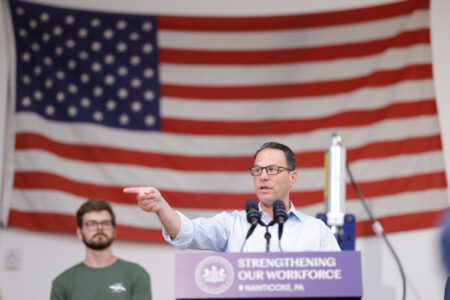Lawmaker wants to overturn fortune-telling ban

House Rep. Greg Scott, D-Norristown, is pictured during a committee hearing.
Does Rep. Greg Scott’s proposal to remove state prohibitions on fortune telling stand a chance of becoming law?
It’s hard to tell.
Scott, D-Norristown, is circulating a co-sponsorship memorandum for legislation that would reverse an 1861 law that makes it illegal for fortune tellers to make a profit from fortune telling. Some states have had such laws struck down, though a decision hasn’t been made in a case brought in Pennsylvania. Other states, like New York, make an exception for fortune telling as part of a show or exhibition for entertainment.
Minnesota, North Carolina, Oklahoma and Wisconsin are among the other states with prohibitions on fortune telling.
Pennsylvania’s law was updated in 1939 and 1972, but it is still illegal to tell someone’s fortune in exchange for money.
According to a 2024 Spotlight PA story, Buck Lawrence, owner of The Serpent’s Key Shoppe & Sanctuary, an apothecary in Hanover, has filed a federal lawsuit against Hanover, Pa., alleging the state law violates Lawrence’s First Amendment rights. There’s been no decision in the case.
In 2004, Federal District Court Judge Robert Echols struck down a local ban on fortune telling in a challenge brought by the American Civil Liberties Union of Tennessee. The ACLU filed the lawsuit last July on behalf of Beth Daly, owner of The Curiosity Corner in Dickson. The shop sells candles, yoga supplies, local artwork, books, and music. Until she was notified about the city ordinance that prohibits fortune telling, Daly was regularly holding tarot readings in her shop. Daly was told by city officials that she could not continue to conduct tarot card readings for profit at her shop because the activities violated a Dickson City Ordinance that prohibits “any person to conduct the business of, solicit for, or ply the trade of fortune teller, clairvoyant, hypnotist, spiritualist, palmist, phrenologist, or other mystic endowed with supernatural powers.””
After rewriting the ordinance to regulations on fortune-telling, including a requirement that fortune-tellers display written disclaimers on their premises and in their advertising, the ACLU amended its complaint to challenge the constitutionality of the new ordinance and won in court.
Last year, according to an Associated Press article, the City Council in Norfolk, Virginia, repealed a 45-year-old ban this week on “the practice of palmistry, palm reading, phrenology or clairvoyance, for monetary or other compensation.”
“Currently in Pennsylvania, fortune telling can result in a misdemeanor of the third degree,” Scott wrote in his co-sponsorship memorandum. “As a result, the livelihood of individuals engaged in fortune telling, including tarot card reading, is put at risk. I have had constituents reach out calling for a repeal of this law, believing it to improperly target fortune telling and other amusements. I agree that it is time to update Pennsylvania’s laws.”




